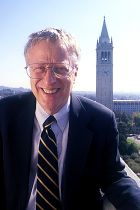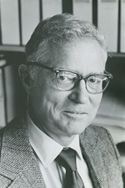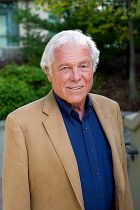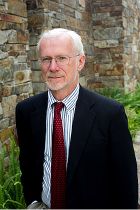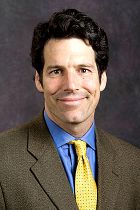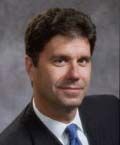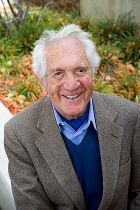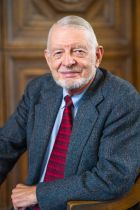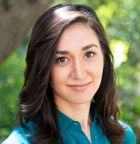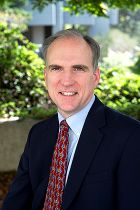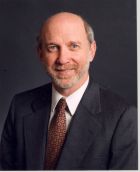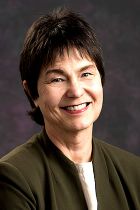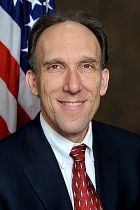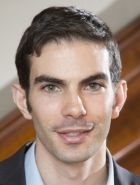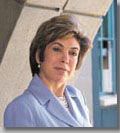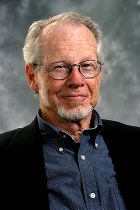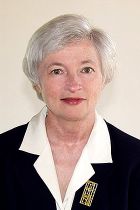Faculty profiles
Members of the Economics Department
George A. Akerlof
Daniel E. Koshland, Sr. Distinguished Professor Emeritus of Economics; Nobel Laureate 2001
About George A. Akerlof
George Akerlof was educated at Yale and the Massachusetts Institute of Technology, where he received his PhD in 1966, the same year he became an assistant professor at Berkeley. He became a full professor in 1978.Professor Akerlof is a 2001 recipient of the Alfred E. Nobel Prize in Economic Science; he was honored for his theory of asymmetric information and its effect on economic behavior. He is also the 2006 President of the American Economic Association. He served earlier as vice president and member of the executive committee. He is also on the North American Council of the Econometric Association.
Robert M. Anderson
Coleman Fung Professor Emeritus of Risk Management; Director, Center for Risk Management Research; Professor of the Graduate School; Distinguished Professor Emeritus of Economics; Distinguished Professor Emeritus of Mathematics
Alan J. Auerbach
Robert D. Burch Professor of Economics and Law
About Alan J. Auerbach
Alan J. Auerbach is the Robert D. Burch Professor of Economics and Law, Director of the Burch Center for Tax Policy and Public Finance, and former Chair of the Economics Department at the University of California, Berkeley. He is also a Research Associate of the National Bureau of Economic Research and previously taught at Harvard and the University of Pennsylvania, where he also served as Economics Department Chair. Professor Auerbach was Deputy Chief of Staff of the U.S. Joint Committee on Taxation in 1992 and has been an adviser to several government agencies and institutions. He is a Distinguished Fellow of the American Economic Association, having previously served as an Executive Committee Member and Vice President of that association and as Editor of its Journal of Economic Perspectives and American Economic Journal: Economic Policy. Professor Auerbach is a past President of the National Tax Association, from which he received the Daniel M. Holland Medal, and is currently President of the Western Economic Association International. He is a Fellow of the American Academy of Arts and Sciences, the Econometric Society, and the National Academy of Social Insurance.
Matthew Backus
Associate Professor
Nano Barahona
Assistant Professor
About Nano Barahona
Pranab K. Bardhan
Distinguished Professor Emeritus of Economics
About Pranab K. Bardhan
Pranab Bardhan, a Cambridge University PhD, has been at Berkeley since 1977, following teaching appointments at MIT and the Delhi School of Economics. He was the chief editor of the Journal of Development Economics for 1985-2003. He was the co-chair of the MacArthur Foundation-funded Network on the Effects of Inequality on Economic Performance for 1996-2007. He held the Distinguished Fulbright Siena Chair at the University of Siena, Italy in 2008-9. He is the BP Centennial Professor at London School of Economics for 2010 and 2011.He is the author of 12 books and more than 150 journal articles, and the editor of 12 other books.He has done theoretical and field studies research on rural institutions in poor countries, on political economy of development policies, and on international trade. A part of his work is in the interdisciplinary area of economics, political science, and social anthropology. His current research involves theoretical and empirical work on decentralized governance, and the political economy of development in China and India.
George Break
Professor (In Memoriam)
About George Break
Professor Break served as Chairman of the Berkeley Economics Department from 1969 to 1973. During the 1980s, he was President of the National Tax Association, which later honored him with its Holland Medal, and was appointed by California Governor George Deukmejian to the Governor's Tax Reform Advisory Commission. His advising activities extended well beyond California's borders, including work evaluating the tax systems of Greece and Jamaica.
A native of Canada who served in the Royal Canadian Air Force during World War II, Break held a Berkeley Ph.D. and had been a member of the Department since his first appointment as an Assistant Professor in 1951. During his time in Berkeley he became a leader in the field of Public Finance and made many important contributions to this field, including early and influential empirical research efforts on the effects of income taxation on work incentives and several books and published papers on intergovernmental relations and various aspects of tax reform in the United States and Canada. Among his best known books are Public Finance (with Earl Rolph), Federal Tax Reform: The Impossible Dream (with Joseph Pechman), and Financing Government in a Federal System. Among his many students at Berkeley was Michael Boskin, Chairman of the Council of Economic Advisors under President George H.W. Bush.
Clair Brown
Professor Emerita
About Clair Brown
Clair Brown, PhD, is Professor of Economics emerita and Director of the Center for Work, Technology and Society at the University of California, Berkeley. Brown has published research on many aspects of how economies function, including inequality, sustainability, high-tech industries, the standard of living, and wage determination,. Her books include American Standards of Living, and Chips and Change: How crisis reshapes the semiconductor industry. Her most recent book Buddhist Economics: An enlightened approach to the dismal science (Bloomsbury Press) provides an economic framework that integrates global sustainability, shared prosperity and care for the human spirit. Brown’s research team developed a Sustainable Share-prosperity Policy Index that evaluates 50 countries’ economic policies according to how well they protect the environment (sustainability), structure markets to achieve social goals (equity), and provide basic services and opportunities (wellbeing). One aspect of this work is the development of a measure of economic performance based on the quality of life, and to estimate it for state of California. The Genuine Progress Index (GPI) integrates measurements of inequality and environmental degradation as well as value of nonmarket activities and consumption to provide an inclusive measurement of sustainable economic performance to guide policy. At UCB Brown co-founded a new graduate program called Development Engineering, for students in engineering and economics to develop their multidisciplinary skills for designing, building, and evaluating new technologies to help developing or under-resourced regions.
You can listen to podcasts with Clair: https://buddhisteconomics.net/podcasts/
Book trailer (2 min): https://youtu.be/88RX5A2iezs
Brown’s economic approach is published in Eminent Economists II (Cambridge University Press, 2013).
Clair Brown has also been actively involved in climate justice work or the past decade. Clair Brown volunteered and provided economic analysis and assisted with community advocacy for climate justice organizations, including 350 Bay Area, Fossil Free California, Sierra Club and Earth Justice. For five years Brown was the co-chair of the 350 Bay Area Action Legislative team, which educated and lobbied Legislators to pass effective and equitable climate policies and worked with state agencies to implement the climate laws to be inclusive and reduce the impact of GHG emissions on vulnerable communities.
Brown’s UC Berkeley student research team worked with Fossil Free California to evaluate the financial risk of state pension funds, especially CalPERS, investing in fossil fuel industry assets. They wrote several academic reports, commented at the CalPERS Board meetings, and worked with lawmakers to draft bills that mandated corporate reporting of their risks related to fossil fuel use, and required divestment of specific fossil fuel assets by the state public pension funds. Here is a recent report. https://fossilfreeca.org/promises-promises-evaluating-calpers-climate-engagements/
Brown in coordination with Prof. Julia Walsh, MD collaborated with the following Environmental and Climate Justice organizations to produce critiques of transportation analyses and analyses of health and economic costs of oil and gas wells and PM2.5 in California. These organizations include VISION, Center for Biological Diversity, EarthJustice, Center for Race Poverty and the Environment, Sierra Club, Communities for a Better Environment, California Environmental Justice Alliance (CEJA), National Resources Defense Council, Physicians for Social Responsibility-SF, 350 Bay Area, and Fossil Free California. The CA state agencies to whom these memos were addressed included CalGEM, CARB, BAAQMD, CalEPA, OEHHA, as well as Legislators. Examples of these memos include: CalEPA memo Critique of UCSB Carbon Neutrality Study (Supply Side); CalGEM memo on setback ruling
Sydnee Caldwell
Assistant Professor
David Card
Class of 1950 Professor Emeritus of Economics; Professor of the Graduate School; Nobel Laureate 2021
About David Card
David Card is the Class of 1950 Professor Emeritus of Economics at the University of California, Berkeley, and Director of the Center for Labor Economics and the Econometric Lab. Before joining Berkeley he taught at University of Chicago in 1982‐83 and Princeton University from 1983 to 1996. He has held visiting appointments at Columbia University, Harvard University, UCLA, and the Center for Advanced Study in the Behavioral Sciences. From 2012 to 2017 he was Director of the Labor Studies Program at the National Bureau of Economic Research. Card’s research interests include wage determination, education, inequality, immigration, and gender‐related issues. He co‐authored the 1995 book Myth and Measurement: The New Economics of the Minimum Wage, co‐edited eight additional titles, and has published over 100 journal articles and book chapters. In 1995, he received the American Economic Association's John Bates Clark Prize, which is awarded to the economist under 40 whose work is judged to have made the most significant contribution to the field. He was President of the AEA in 2021 and co‐recipient of the Nobel Memorial Prize in Economics in 2021.
Roger Craine
Professor
About Roger Craine
Roger Craine joined UC Berkeley as a Professor in 1977 after serving as Senior Economist on the Board of Governors of the Federal Reserve System from 1968-1977. He also served as Economist from 1981-1982 at the Federal Reserve System. He currently is on the JEDC Board of Advisors and is a member of the IFAC International Program Committee. Professor Craine also was Special Projects Editor for the Review of Economic Dynamics from 1997-2000 and Editor of the Journal of Economic Dynamics and Control from 1987-1994. Between 1992-1997 he was a member of the International Bureau for Economic Research, and he was a member of the Council of the Society for Economic Dynamics between 1994-2004.
Jan de Vries
Sidney Hellman Ehrman Professor Emeritus of History and Distinguished Professor Emeritus of Economics
Stefano DellaVigna
Daniel E. Koshland, Sr. Distinguished Professor of Economics and Professor of Business Administration
About Stefano DellaVigna
Stefano DellaVigna (2002 Ph.D., Harvard) is the Daniel Koshland, Sr. Distinguished Professor of Economics and Professor of Business Administration at the University of California, Berkeley. He specializes in Behavioral Economics (a.k.a, Psychology and Economics) and is a co-director of the Initiative for Behavioral Economics and Finance. He has published in international journals such as the American Economic Review, the Quarterly Journal of Economics, the Journal of Finance, and the Journal of Labor Economics. He has been a Principal Investigator for an NSF Grant (2004-07), an Alfred P. Sloan Fellow for 2008-10, and is a Distinguished Teaching Award winner (2008). He was also a co-editor of the Journal of the European Economic Association (JEEA) from 2009 to 2013. His recent work has focused on (i) the economics of the media, and in particular the impact on voting (through persuasion) and the study of conflicts of interest; (ii) the design of model-based field experiments, including the role of social pressure in charitable giving and voting, and (iii) the analysis of scientific journals and in particular editorial choices; (iv) the study of reference-dependence for unemployed workers.

J.Bradford DeLong
Professor
About J.Bradford DeLong
Brad DeLong is a professor of economics at U.C. Berkeley, a research associate of the National Bureau of Economic Research, a weblogger at the Washington Center for Equitable Growth, and a fellow of the Institute for New Economic Thinking. He received his B.A. and Ph.D. from Harvard University in 1982 and 1987. He joined UC Berkeley as an associate professor in 1993 and became a full professor in 1997.
Professor DeLong also served in the U.S. government as Deputy Assistant Secretary of the Treasury for Economic Policy from 1993 to 1995. He worked on the Clinton Administration's 1993 budget, on the Uruguay Round of the General Agreement on Tariffs and Trade, on the North American Free Trade Agreement, on macroeconomic policy, and on the unsuccessful health care reform effort.
Before joining the Treasury Department, Professor DeLong was Danziger Associate Professor in the Department of Economics at Harvard University. He has also been a John M. Olin Fellow at the National Bureau of Economic Research, an Assistant Professor of Economics at Boston University, and a Lecturer in the Department of Economics at M.I.T.
Federico Echenique
Professor
About Federico Echenique
Aaron Edlin
Richard Jennings Endowed Chair, Professor of Economics, Professor of Law
About Aaron Edlin
Aaron Edlin is a leading expert in economics and law, specializing in antitrust economics and law, and is the co-founder of the Berkeley Electronic Press. He has taught at Berkeley since 1993 and received tenure in 1997. He now holds the Richard Jennings Chair and professorships in both the economics department and law school. Professor Edlin served as Senior Economist at the Council of Economic Advisers in the Clinton White House covering industrial organization, regulation and antitrust. In 2004, he became co-author with P. Areeda & L. Kaplow of one of the leading casebooks on antitrust; he has also published many articles on industrial organization, competition policy, antitrust law, and a variety of other issues in economics, law and public policy. He received his Ph.D. and J.D. from Stanford, 1993; AB Summa Cum Laude from Princeton, 1988.
Barry Eichengreen
George C. Pardee & Helen N. Pardee Chair and Distinguished Professor of Economics and Political Science
About Barry Eichengreen
Barry Eichengreen is George C. Pardee & Helen N. Pardee Chair and Distinguished Professor of Economics and Political Science at the University of California, Berkeley, where he has taught since 1987. He is a Research Associate of the National Bureau of Economic Research (Cambridge, Massachusetts) and Research Fellow of the Centre for Economic Policy Research (London, England). In 1997-98 he was Senior Policy Advisor at the International Monetary Fund. He is a fellow of the American Academy of Arts and Sciences (class of 1997). Professor Eichengreen is the convener of the Bellagio Group of academics and economic officials and chair of the Academic Advisory Committee of the Peterson Institute of International Economics. He has held Guggenheim and Fulbright Fellowships and has been a fellow of the Center for Advanced Study in the Behavioral Sciences (Palo Alto) and the Institute for Advanced Study (Berlin). He is a regular monthly columnist for Project Syndicate. His books include The Populist Temptation: Economic Grievance and Political Reaction in the Modern Era (2018), How Global Currencies Work: Past, Present, and Future, with Livia Chitu and Arnaud Mehl, (2017), The Korean Economy: From a Miraculous Past to a Sustainable Future (Harvard East Asian Monographs) with Wonhyuk Lim, Yung Chul Park and Dwight H. Perkins, (2015), Renminbi Internationalization: Achievements, Prospects, and Challenges, co-edited with Masahiro Kawai, (2015), Hall of Mirrors: The Great Depression, The Great Recession, and the Uses-and Misuses-of History, (2015). He was awarded the Economic History Association's Jonathan R.T. Hughes Prize for Excellence in Teaching in 2002 and the University of California at Berkeley Social Science Division's Distinguished Teaching Award in 2004. He is also the recipient of a doctor honoris causa from the American University in Paris.
Haluk Ergin
Associate Professor
Benjamin Faber
Associate Professor
About Benjamin Faber
Ben Faber joined the department in 2013. His work is at the intersection of international trade and development economics.
Joseph Farrell
Professor of the Graduate School
About Joseph Farrell
Joseph Farrell was educated at Oxford University, where he received his D.Phil. in 1981. He joined UC Berkeley in 1989 as an associate professor and became a full professor in 1991, and Professor in the Graduate School in 2020. He was elected a Fellow of the Econometric Society in 2002, and received the Public Service Award from the Industrial Organization Society in 2016. Professor Farrell previously was Director of the Bureau of Economics at the Federal Trade Commission, Deputy Assistant Attorney General for Economics with the U.S. Dept. of Justice, Chief Economist at the Federal Communications Commission, assistant professor at MIT, a principal member of the technical staff at GTE Laboratories, and National Fellow at the Hoover Institution. He served on the Computer Science and Telecommunications Board at the National Academies of Science. He was Editor of the Journal of Industrial Economics, President of the Industrial Organization Society, and Chair of Berkeley's Competition Policy Center.
Frederico Finan
George Break and Helen Schnacke Break Distinguished Professor of Economics and Professor of Business Administration
About Frederico Finan
Frederico Finan joined the department in 2009 as an assistant professor. He received his PhD in Agriculture and Resource Economics from UC-Berkeley in 2006. Prior to joining the department, Professor Finan was an assistant professor of economics at UCLA. He is also an affiliate of Bureau for Research and Economic Analysis of Development(BREAD), and a research fellow at IZA and National Bureau of Economic Research (NBER).
Albert Fishlow
Professor Emeritus of Economics
Cecile Gaubert
Associate Professor
Richard J. Gilbert
Distinguished Professor Emeritus of Economics
About Richard J. Gilbert
Richard Gilbert was educated at Stanford University, where he received his PhD in 1976, the same year he joined UC Berkeley as an assistant professor. He became a full professor in 1983. His research is in industrial organization and regulation with an emphasis on competition policy, innovation and intellectual property. He is currently a Distinguished Professor Emeritus of Economics. He served as Chair of Berkeley's Economics Department from 2002-2005. Professor Gilbert previously was Deputy Assistant Attorney General for Economics with the U.S. Justice Department and was Director of the University of California Energy Institute. He was a Fulbright Scholar in 1989 and was a visiting fellow at Churchill College, University of Cambridge in 1979 and 2006.
Lisa Goldberg
Professor of the Practice of Economics
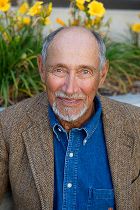
Steven Goldman
Professor (In Memoriam)
About Steven Goldman
Yuriy Gorodnichenko
Quantedge Presidential Professor of Economics
About Yuriy Gorodnichenko
Pierre-Olivier Gourinchas
Professor of Economics, Department of Economics; S.K. and Angela Chan Professor of Global Management, Haas School of Business; Director, Clausen Center for International Business and Policy
About Pierre-Olivier Gourinchas
Pierre-Olivier Gourinchas grew up in France where he attended Ecole Polytechnique. He received his PhD in 1996 from MIT and taught at Stanford Graduate School of Business and Princeton University before joining the Berkeley economics department in 2003 as an assistant professor. He is a Research Associate with NBER and a Research Fellow with CEPR (London) and the International Growth Center (London).Professor Gourinchas is editor of the IMF Economic Review. He is also associate editor of the Journal of the European Economic Association and a member of the Scientific Committee of the Fondation Banque de France. He is the winner of the 2007 Bernacer Prize for best European Economist under 40 working in macroeconomics and finance, and winner of the 2008 prize for best French economist under 40.
Bryan S. Graham
Professor
About Bryan S. Graham
Bryan Graham was educated at Oxford University and Harvard University, where he received his PhD in 2005, the same year he joined Berkeley as an assistant professor.Professor Graham was awarded a Macarthur Network on Social Interactions and Economic Inequality Fellowship in 2004, a Harvard University Program on Justice, Welfare, and Economics Fellowship in 2003, and a National Science Foundation Graduate Fellowship in 2000. He also received a Rhodes Scholarship in 1997 and a Fulbright Scholarship in 1998.
Gregory Grossman
Professor (In Memoriam)
Bronwyn H. Hall
Professor Emerita
About Bronwyn H. Hall
Bronwyn H. Hall is Emerita Professor at the University of California at Berkeley, a Research Associate of the National Bureau of Economic Research and the Institute for Fiscal Studies, London, and a Visiting Fellow at NIESR, London. She currently serves as an associate editor of the Economics of Innovation and New Technology, and of Industrial and Corporate Change. She is a also a member of several advisory boards (Solvay Brussels School of Economics and Management, European Patent Office, DIW - German Institute for Economic Research). She received a B.A. in physics from Wellesley College in 1966 and a Ph.D. in economics from Stanford University in 1988.
Ben Handel
Associate Professor
About Ben Handel
Ben Handel is an Associate Professor of Economics at the University of California at Berkeley and Faculty Research Fellow at the National Bureau of Economic Research (NBER). He is a 2015 Alfred P. Sloan Research Fellow in Economics and participated in the 2010 Review of Economics Studies European Tour. His research focuses on the microeconomics of consumer choice and market structure in the health care sector, with an emphasis on health insurance markets. His most recent research has emphasized the important role that consumer choice frictions, such as inertia and limited information, can have when assessing the welfare outcomes of different regulatory policies in health insurance markets. In addition, his work studies incentive design and adoption of information technology by medical providers. Dr. Handel has partnered with a range of large firms and policy organizations in the health care sector to study questions in these areas. He completed his Ph.D. in economics from Northwestern University in 2010, and completed a postdoctoral fellowship with the Robert Wood Johnson Foundation in 2011. He received an A.B. in economics from Princeton University in 2004.
Benjamin E. Hermalin
Thomas & Alison Schneider Distinguished Professor of Finance and Professor of Economics
About Benjamin E. Hermalin
Ben Hermalin is a noted expert on corporate governance, leadership, and the economics of organization. He has published over 40 peer-reviewed journal articles, including in top journals such as the American Economic Review, Econometrica, the RAND Journal, and the Journal of Finance. He holds professorships in both the Economics Department and in Berkeley's Haas School of Business, where he is the Thomas & Alison Schneider Distinguished Professor of Finance. He served as the Economics Department Chair from 2005 - 2008, Chair of the Academic Senate from 2015-20016, and is currently serving as the Vice Provost for the Faculty. He also serves on the Board of Directors of the NBER. Professor Hermalin received his PhD from MIT in 1988, the same year he joined UC Berkeley as assistant professor in the Department of Economics and the School of Business. He became a full professor in 1998.
Hilary Hoynes
Professor of Public Policy and Economics, Haas Distinguished Chair in Economic Disparities
About Hilary Hoynes
See homepage.
Michael Jansson
Edward G. and Nancy S. Jordan Family Professor of Economics
About Michael Jansson
Michael Jansson joined Berkeley as a research economist in 2000, the same year he received his PhD at University of Aarhus in Denmark. He became an assistant professor in 2001, an associate professor in 2007, and a professor in 2013. Michael is a member of the Econometric Society, Associate Editor of Econometrica, and Co-Editor of Econometric Theory and The Econometrics Journal. He received an Econometric Theory Multa Scripsit Award in 2005 and an Alfred P. Sloan Research Fellowship in 2007.
Shachar Kariv
Benjamin N. Ward Professor of Economics
About Shachar Kariv
I am the Benjamin N. Ward Professor of Economics. I was educated at Tel Aviv University and New York University, where I received my Ph.D. in economics in 2003, the same year I joined the Department of Economics at the University of California, Berkeley. I have been the Department Chair (2014-17) the Faculty Director of UC Berkeley Experimental Social Science Laboratory (2009-2014), aka Xlab, a laboratory for conducting experiment-based investigations of issues of interest to social sciences. I am also a co-founder of Xmobile, a new platform for conducting social science experiments that builds on the ubiquity and functionalities of Smartphones.
I was a visiting member of the School of Social Science at the Institute for Advanced Studies at Princeton (2005-6), a visiting professor at the European University Institute (2008), a visiting fellow at Nuffield College of the University of Oxford (2009), a visiting professor at the Interdisciplinary Center (IDC) Herzliya (2011-12), and a visiting professor at the Department of Economics at Stanford University (2014). I am also a visiting professor (Professor II) at the Department of Economics at the NHH Norwegian School of Economics where I am affiliated with the Choice Lab.
I am the recipient of the UC Berkeley Haas School of Business Cheit Award for Excellence in Teaching (2012), the UC Berkeley Division of Social Sciences Distinguished Teaching Award (2008), and the Graduate Economics Association Outstanding Advising Award (2006). I was also awarded NYU College of Arts and Science Outstanding Teaching Award (Golden Dozen) in recognition of excellence in teaching and contributions to undergraduate education (2002) and NYU Dean’s Outstanding Teaching Award in the Social Sciences (2001). For my Ph.D. dissertation at NYU, I received the Outstanding Dissertation Award in the Social Sciences (2003). I was also awarded a Sloan Research Fellowship for Economics (2009-10).
Michael Katz
Sarin Chair in Strategy and Leadership; Distinguished Professor Emeritus of Economics
About Michael Katz
Michael Katz has taught at Berkeley since 1987. He holds the Sarin Chair in Strategy and Leadership and professorships in both the Economics Department and the Haas School of Business, where he is a member of the Economic Analysis and Policy Group. Professor Katz has served as Deputy Assistant Attorney General for Economic Analysis in the Antitrust Division of the U.S. Department of Justice; Chief Economist at the Federal Communications Commission, where he received the Chairman's Special Achievement Award; and Assistant Professor of Economics at Princeton University. He is a two-time recipient of the Earl F. Cheit Award for Excellence in Teaching and was an Alfred P. Sloan Research Fellow. He received his Ph.D. from Oxford University.
Supreet Kaur
Associate Professor
Kei Kawai
Assistant Professor
Theodore Keeler
Professor
Patrick Kline
Professor
About Patrick Kline
Patrick Kline is a Professor of Economics at UC Berkeley and a faculty research associate at the National Bureau of Economic Research. His research focuses on the determinants of wage inequality and the effectiveness of public policies designed to combat inequality. Dr. Kline is a fellow of the Econometric Society and serves as foreign editor of the Review of Economic Studies and an associate editor at Econometrica and at the American Economic Journal: Applied. Dr. Kline is a leading expert on the economics of imperfectly competitive labor markets, place-based policies, and program evaluation methods. In 2018 he was awarded the Sherwin Rosen Prize for outstanding contributions to the field of labor economics and in 2021 he won the IZA Young Labor Economist award for his contributions to empirical methodology in labor economics.
Jon Kolstad
Associate Professor
Ronald D. Lee
Edward G. and Nancy S. Jordan Family Professor Emeritus of Economics; Distinguished Professor Emeritus of Economics; Distinguished Professor Emeritus of Demography; Associate Director, Center for the Economics and Demography of Aging (CEDA)
About Ronald D. Lee
Professor Ronald D. Lee holds a Ph.D. in Economics from Harvard University. He spent a postdoctoral year at the National Institute of Demographic Studies (INED, France). After teaching for eight years at the University of Michigan, he joined Demography at Berkeley in 1979, with a joint appointment in Economics. He currently holds the Edward G. and Nancy S. Jordan Endowed Chair in Economics. Professor Lee is also the Director of the Center on the Economics and Demography of Aging at Berkeley.Professor Lee is an elected member of the National Academy of Sciences, the American Association for the Advancement of Science, the American Academy of Arts and Sciences, and a Corresponding member of the British Academy. His other honors include Presidency of the Population Association of America and its Mindel C. Sheps Award for research in Mathematical Demography, and the Irene B. Taeuber Award for outstanding contributions in the field of demography. He also has chaired the population and social science study section for NIH and the National Academy of Sciences Committee on Population and has served on the National Advisory Committee on Aging. He is currently on the National Advisory Committee on Child Health and Human Development.
John M. Letiche
Professor (In Memoriam)
About John M. Letiche
Chen Lian
Assistant Professor
Ulrike Malmendier
Edward and Mollie Arnold Professor of Finance and Professor of Economics
About Ulrike Malmendier
Ulrike Malmendier is the Edward J. and Mollie Arnold Professor at the University of California at Berkeley, Professor of Economics, Department of Professor of Finance, Haas School of Business. Ulrike Malmendier received her PhD in Business Economics from Harvard University in 2002, and her PhD in Law (summa cum laude) from the University of Bonn in 2000. She joined Berkeley in 2006 as an Assistant Professor, after having been at Stanford as Assistant Professor of Finance since 2002. She also is a research associate at NBER (Corporate Finance and Labor Economics) and a faculty research fellow at IZA, a CESifo affiliate, and a CEPR research affiliate. She has been a Visiting Scholar at the Max-Planck Institute in Bonn, Visiting Fellow at Princeton University, and Visiting Assistant Professor of Finance at the Graduate School of Business at the University of Chicago. Recently, she was named Alfred P. Sloan Research Fellow (2010-2012), and she received several Citations of Excellence by Emerald for her research (2009, 2006). She was named Distinguished Speaker at the European Financial Management meeting in Milan, Italy, Keynote Speaker at the ERIM Invitational Conference "Frontiers in Research in Management" in Rotterdam (NL), and Distinguished Speaker at the Mergers and Acquisitions conference in Exeter (UK). She was a selected speaker at the Review of Economic Studies European Tour 2002. She has received fellowships and grants from numerous institutions in the U.S. and Europe.She currently serves as associate editor for the Journal of Financial Intermediation, the Economic Journal, and the Journal of the European Economic Association as well as the guest associate editor for the Special Issue on Behavioral Economics and Finance of Management Science. She has been on the program committee and organized numerous sessions at the annual meetings of the American Economic Association, American Finance Association, and Western Finance Association. She also was one of the founders and is a continuing organizer of the Behavioral Economics Annual Meeting (BEAM) as well as an organizer of the Psychology and Economics segment of the Stanford Institute in Theoretical Economics (SITE).
Malmendier has received numerous honors, awards, and prizes, including the 2017 Guggenheim Fellowship, and the Alfred P. Sloan Research Fellowship, several Emerald Citations of Excellence by Emerald, Distinguish or Keynote Speaker engagements. In 2015 she was awarded the Distinguished Teaching Award, University of California at Berkeley most prestigious honor for teaching. She was also a selected speaker at the Review of Economic Studies European Tour.
In 2013, Malmendier was awarded the prestigious Fisher Black Prize from the American Finance Association, given biennially to the top financial scholar under the age of 40. The award citation referred to Malmendier’s work in corporate finance, behavioral economics and finance, contract theory, and the history of the firm, particularly noting the originality and creativity of her research. Malmendier’s area of focus is the intersection of economics and finance, and why and how individuals make decisions—specifically how individuals make mistakes and systematically biased decisions. Some of her work includes research on CEO overconfidence, the long-term frugality of Depression “babies” and the decision-making behind gym membership. Professor Malmendier’s research interests: corporate finance, behavioral economics/behavioral finance, economics of organizations, contract theory, law and economics, law and finance.
http://eml.berkeley.edu/~ulrike/cv.pdf
http://facultybio.haas.berkeley.edu/faculty-list/malmendier-ulrike
Daniel L. McFadden
E. Morris Cox Professor Emeritus of Economics; Nobel Laureate 2000
About Daniel L. McFadden
Daniel L. McFadden is the E. Morris Cox Professor of Economics and Director of the Econometrics Laboratory. He is the 2000 Nobel Laureate in Economics for his work in econometric methods for studying behavioral patterns in individual decision-making. Following the completion of his PhD in 1962 at the University of Minnesota, Professor McFadden went to the University of Pittsburgh as a Mellon postdoctoral fellow. The following year, he joined UC Berkeley's economics department. In 1979, Professor McFadden moved to the economics faculty at MIT, and in 1991 he returned to UC Berkeley. Among his many awards and honors, Professor McFadden received the John Bates Clark Medal from the American Economics Association in 1975; he was elected to the American Academy of Arts & Sciences in 1977 and to the National Academy of Science in 1981; in 1985 he delivered the Jahnsson Foundation Lectures in Helsinki, Finland; in 1986 he won the Frisch Medal from the Econometrics Society, and in 2000 he received the Nemmers Prize in Economics from Northwestern University.
Edward Miguel
Oxfam Professor in Environmental and Resource Economics and Distinguished Professor of Economics
About Edward Miguel
Edward Miguel is the Oxfam Professor of Environmental and Resource Economics and Faculty Director of the Center for Effective Global Action at the University of California, Berkeley, where he has taught since 2000
He earned S.B. degrees in both Economics and Mathematics from MIT, received a Ph.D. in Economics from Harvard University, where he was a National Science Foundation Fellow, and has been a visiting professor at Princeton University and Stanford University.
Ted's main research focus is African economic development, including work on the economic causes and consequences of violence; the impact of ethnic divisions on local collective action; and interactions between health, education, environment, and productivity for the poor. He has conducted field work in Kenya, Sierra Leone, Tanzania, and India. Ted is a Faculty Research Associate of the National Bureau of Economic Research, has served as Associate Editor of the Quarterly Journal of Economics and Journal of Development Economics, is a recipient of the 2005 Alfred P. Sloan Fellowship, and winner of the 2005 Kenneth J. Arrow Prize awarded annually by the International Health Economics Association for the Best Paper in Health Economics.
Ted is a recipient of the 2012 U.C. Berkeley campus-wide Distinguished Teaching Award, the Best Graduate Adviser Award in the Berkeley Economics Department, and has served on over 70 completed doctoral dissertation committees.
He co-founded the Center for Effective Global Action (CEGA) in 2007 and serves as Faculty Director. He has served as the Co-organizer (with Dan Posner of UCLA) of the Worklng Group in African Political Economy (WGAPE) since 2002. Ted is also the co-founder and Faculty Director of the Berkeley Initiative for Transparency in the Social Sciences (BITSS).
Miguel has written two books, Africa's Turn? (MIT Press 2009), and, with Ray Fisman, Economic Gangsters: Corruption, Violence and the Poverty of Nations (Princeton University Press 2008). Economic Gangsters has been translated into ten languages, and the New York Times' Nicholas Kristof praises it as "smart and eminently readable". Miguel's other writing has appeared in Foreign Affairs, Forbes, and the New York Times.
Enrico Moretti
Michael Peevey and Donald Vial Professor of Economics; Professor of Business Administration

John Morgan
Professor (In Memoriam)
About John Morgan
John Morgan was the Gary and Sherron Kalbach Professor of Entrepreneurship. He was a director of the Fisher Information Technology Center and the Experimental Social Sciences Laboratory (Xlab). Prior to coming to Berkeley, John was a professor at the Woodrow Wilson School of Public and International Affairs at Princeton University. He earned his PhD and MS from the Pennsylvania State University as well as earning a BS (summa cum laude) at the Wharton School of the University of Pennsylvania. Professor Morgan is an editor for the Berkeley Electronic Journals for Theoretical Economics. He is also an associate editor at Management Science and Economic Theory and a member of the editorial board for the California Management Review. His most recent consulting experience is in the area of auctions and dynamic pricing for Google, Digonex, and Paging Systems. He has received awards from the National Science Foundation, and he was selected as a visiting scholar at the Hoover Institution and the International Monetary Fund. His research on online pricing earned him a best paper award for 2004 in Journal of Industrial Economics. His article "Price Dispersion in the Large and in the Small: Evidence from an Internet Price Comparison Site" won the Journal of Industrial Economics "best article" prize, 2005. His class on game theory is one of the most popular at the Haas School of Business. John was a finalist for the Earl F. Cheit teaching award in 2003.
Mathilde Munoz
Assistant Professor
Emi Nakamura
Chancellor's Professor of Economics
About Emi Nakamura
Maurice Obstfeld
Class of 1958 Professor of Economics; Professor of the Graduate School; Chancellor's Professor Emeritus
About Maurice Obstfeld
Maurice Obstfeld is the Class of 1958 Professor of Economics Emeritus. He joined Berkeley in 1989 as a professor, following appointments at Columbia (1979-1986) and the University of Pennsylvania (1986-1989). He was also a visiting professor at Harvard between 1989 and 1991. He received his Ph.D. from MIT in 1979, following degrees from the University of Pennsylvania and the University of Cambridge. In 2014-2015 he was a Member of President Obama’s Council of Economic Advisers, and from 2015-2018 he served as chief economist at the International Monetary Fund. Before that, he served as an honorary adviser to the Bank of Japan’s Institute of Monetary and Economic Studies. Among Professor Obstfeld's honors are the Frank Graham Lecture at Princeton, the inaugural Mundell-Fleming Lecture of the International Monetary Fund, the Bernhard Harms Prize and Lecture of the Kiel Institute for World Economy, and the Richard Ely Lecture of the American Economic Association. Professor Obstfeld is a Fellow of the Econometric Society and the American Academy of Arts and Sciences. He is active as a research fellow of the Centre for Economic Policy Research and a research associate of the National Bureau of Economic Research. Most recently, he has joined the Peterson Institute for International Economics in Washington, D.C., as a nonresident senior fellow.
Martha L. Olney
Teaching Professor Emerita
About Martha L. Olney
Martha Olney is a Teaching Professor Emerita in Berkeley's Economics Department. She joined the department in 1991 as a Research Associate at the Institute of Business and Economic Research. She was a visiting associate professor from 1992 to 2002, when she became an adjunct professor. She was promoted to Teaching Professor (Senior Lecturer with Security of Employment) in July 2017 and retired in July 2022. She served as Chair of the Department's Undergraduate Committee for 9 years, 2012-2021. Professor Olney organized and hosted the Economic History Lunches for graduate students and faculty from 1996 until her retirement in 2022. Prior to joining Berkeley, she was an associate professor of economics at the University of Massachusetts, Amherst, where she had taught since 1984. She has also taught at Stanford University (2001) and Siena College (2011-2012). She received her PhD from Berkeley in 1985. Professor Olney is the recipient of multiple teaching and mentoring awards including Distinguished Teaching Awards from UC Berkeley, UC Berkeley's Social Science Division, and the University of Massachusetts at Amherst, plus awards from Phi Beta Kappa, the Economic History Association, The Stavros Center for Economic Education, and UC Berkeley's Faculty Award for Outstanding Mentorship of GSIs. She is a member of the American Economic Association, Business History Conference, Cliometric Society, Economic History Association, and the Social Science History Association. She previously served on the academic advisory board of the Financial Services Research Program of George Washington University and on the boards of the AEA's Committee for the Status of Women in the Economics Profession, and the Business History Conference. She is currently a member of the board of the AEA's Committee on the Status of LGBTQ+ Individuals in the Economics Profession (CSQIEP) and the AEA's Task Force for Outreach to High School and Undergraduate Students in Economics.

James Pierce
Professor (in Memoriam)
About James Pierce
Demian Pouzo
Associate Professor
About Demian Pouzo
Demian Pouzo joined the Berkeley faculty in 2009 as an assistant professor after receiving his PhD in Economics from NYU. He also holds an MA and BA in Economics from Universidad Torcuato Di Tella (Argentina). Pouzo's current research interests include theoretical econometrics and macroeconomics.
James L. Powell
George Break and Helen Schnacke Break Distinguished Professor Emeritus of Economics
About James L. Powell
James Powell joined the Berkeley faculty in 1993 as a professor. He received his PhD from Stanford in 1982, the same year he became an assistant professor at M.I.T, where he taught until 1985. Prior to coming to Berkeley, he also taught at Carnegie-Mellon University, University of Wisconsin, Madison, University of Chicago, and Princeton University. He has served as associate editor of Econometrica, the Journal of Econometrics, and the International Economic Review, and he was co-chair of the NSF-NBER Conferences on Econometrics and Mathematical Economics. Professor Powell's honors include: Member, American Academy of Arts & Sciences; Fellow, Econometric Society; Fellow, Center for Advanced Study in the Behavioral Sciences; Fellow, Journal of Econometrics; and Alfred P. Sloan Research Fellowship.
John M. Quigley
Distinguished Professor Emeritus of Economics (In Memoriam)
About John M. Quigley
John M. Quigley was the I. Donald Terner Distinguished Professor of Economics. He also held appointments in the Goldman School of Public Policy and the Haas School of Business and was the Director of the Berkeley Program on Housing and Urban Policy. Professor Quigley was a Fellow of the Regional Science Association and the Homer Hoyt Institute. In 2006, he was elected a Foreign Member of the Royal Swedish Academy of Engineering Sciences. He was the recipient of many scholarly awards, for example, the George Bloom Award for Contributions to Urban Economics.Prior to coming to Berkeley, Professor Quigley taught at Yale University. He holds academic degrees from the U.S. Air Force Academy, the University of Stockholm, and Harvard University. He was awarded an honorary doctorate by the Royal Institute Of Technology.
Michael Reich
Professor
About Michael Reich
Michael Reich is Professor of Economics and Chair of the Center on Wage and Employment Dynamics at the Institute for Research on Labor and Employment (IRLE) of the University of California at Berkeley. He served as Director of IRLE from 2004 to 2015. Reich received his Ph.D. in Economics from Harvard. His research publications cover numerous areas of labor economics and political economy, including the economics of racial inequality, the analysis of labor market segmentation, historical stages in U.S. labor markets and social structures of accumulation, high performance workplaces, union-management cooperation, Japanese labor-management systems, living wages and minimum wages.
Reich's publications include 17 books and monographs, including Racial Inequality: A Political-Economic Analysis, Princeton University Press, 1981; Segmented Work, Divided Workers: The Historical Transformation of Labor in the United States, with D. Gordon and R. Edwards, Cambridge University Press, 1982; Social Structures of Accumulation: The Political Economy of Growth and Crisis, with D. Kotz and T. McDonough, eds. Cambridge University Press, 1994; Work and Pay in the United States and Japan, with C. Brown, Y. Nakata and L. Ulman. Oxford University Press, 1997; Labor Market Segmentation and Labor Mobility, 2009, Labor in the Era of Globalization, edited with C. Brown and B. Eichengreen, Cambridge University Press, 2010, Contemporary Capitalism and Its Crises, edited with T. McDonough and D. Kotz, Cambridge University Press, 2010; When Mandates Work: Raising Labor Standards at the Local Level, with K. Jacobs and M.Dietz, University of California Press, 2014.
Reich has also written over 130 papers, including “Minimum Wages Across State Borders with A. Dube and W. Lester, Review of Economics and Statistics, 2010; “Do Minimum Wages Really Reduce Teen Employment?" with S. Allegretto and A. Dube, Industrial Relations, 2011; “High Unemployment after the Great Recession: Why? What Can We Do?" Estudios de Economia Aplicada, 2012; “Credible Research Designs for Minimum Wage Studies" with S. Allegretto, A. Dube, and B. Zipperer, 2013, IRLE Working Paper 148-13, September 2013; "The Effects of Minimum Wages on Food Stamp Enrollments and Expenditures," with R. West, Industrial Relations, October 2015; and "Wage Shocks, Employment Flows, and Labor Market Frictions," with A. Dube and W. Lester, Journal of Labor Economics, forthcoming 2016.
Minimum wage research and reports »
Andrés Rodríguez-Clare
Edward G. and Nancy S. Jordan Professor of Economics; Department Chair
About Andrés Rodríguez-Clare
Rodríguez-Clare is a professor of economics at the University of California, Berkeley, director of the Trade Research Programme at the International Growth Centre, and a research associate of the National Bureau of Economic Research.
He received his Ph.D. at Stanford University in 1993. He was Associate Professor of Business Economics at the University of Chicago before moving to Costa Rica to serve as Chairman of the Council of Presidential Advisors from 1998 to 2002. He was Visiting Professor at Harvard University’s Kennedy School of Government in 2002 and the M.I.T. Department of Economics in 2005, and Senior Research Economist at the Research Department of the Inter-American Development Bank from 2002 to 2005. In 2005 he became professor of economics at Pennsylvania State University, where he stayed until 2011, the year he joined the Berkeley faculty.
Gérard Roland
E. Morris Cox Professor of Economics and Professor of Political Science
About Gérard Roland
Gérard Roland joined the Berkeley faculty as a professor in 2001. He received his PhD from Universite Libre de Bruxelles in 1988 and taught there from 1988-2001. Professor Roland is also a CEPR research fellow, where he was program director between 1995 and 2006. He serves as editor of the Journal of Comparative Economics, and was an associate editor for several other journals.Among Professor Roland's awards and honors are recipient of the Medal of the University of Helsinki, Officier de l'Ordre de Leopold II, and entry in "Who's Who in the World," "Who's Who in America," and Who's Who in Economics since 1776." He was a fellow at the Center for Advanced Studies in Behavioral Sciences in Stanford in 1998-1999. He was program chair of the Fifth Nobel symposium in Economics devoted to the Economics of Transition in 1999. He was named Jean Monnet Professor at Universite Libre de Bruxelles in 2001 and received an Honorary Professorship of Renmin University of China in 2002.
Christina D. Romer
Class of 1957-Garff B. Wilson Professor Emerita of Economics; Professor of the Graduate School; Chancellor's Professor Emerita
About Christina D. Romer
Christina Romer is the Class of 1957-Garff B. Wilson Professor of Economics Emerita. She joined the Berkeley faculty in 1988 and was promoted to full professor in 1993. Professor Romer is co-director of the Program in Monetary Economics at the National Bureau of Economic Research, and is a member of the NBER Business Cycle Dating Committee. She is a fellow of the American Academy of Arts and Sciences and recipient of the Distinguished Teaching Award at the University of California, Berkeley. She has received a John Simon Guggenheim Memorial Foundation Fellowship, the National Science Foundation Presidential Young Investigator Award, and an Alfred P. Sloan Research Fellowship. She has served as vice president and a member of the executive committee of the American Economic Association. Prior to her appointment at Berkeley, she was an assistant professor of economics and public affairs at Princeton University from 1985-1988. She received her Ph.D. from M.I.T. in 1985.
David H. Romer
Herman Royer Professor Emeritum in Political Economy; Professor of the Graduate School; Chancellor's Professor Emeritum
About David H. Romer
David H. Romer is the Herman Royer Professor Emeritus in Political Economy. He joined the Berkeley faculty in 1988 and was promoted to full professor in 1993. Professor Romer is co-director of the Program in Monetary Economics at the National Bureau of Economic Research, and is a member of the NBER Business Cycle Dating Committee. He is a fellow of the American Academy of Arts and Sciences. In addition, he is a member of the American Economic Association Executive Committee, a three-time recipient of Berkeley's Graduate Economic Association's distinguished teaching and advising awards, and the recipient of an Alfred P. Sloan Foundation Research Fellowship. Prior to his appointment at Berkeley, he was assistant professor at Princeton University from 1985-1988. He received his Ph.D. from M.I.T. in 1985.
Thomas J. Rothenberg
Professor
Jesse Rothstein
Carmel P. Friesen Professor of Public Policy and Professor of Economics; Director, California Policy Lab
About Jesse Rothstein
Jesse Rothstein is a professor of public policy and economics. He joined the Berkeley faculty in 2009. He spent the 2009-10 academic year in public service, first as Senior Economist at the U.S. Council of Economic Advisers and then as Chief Economist at the U.S. Department of Labor. Earlier, he was assistant professor of economics and public affairs at Princeton University. He received his Ph.D. in economics from UC Berkeley in 2003.
Daniel Rubinfeld
Robert L. Bridges Professor Emeritus of Law; Distinguished Professor Emeritus of Economics
About Daniel Rubinfeld
Daniel Rubinfeld taught economics and law at the University of Michigan before joining the Berkeley Law faculty in 1983. He was chair of the Jurisprudence and Social Policy (JSP) program from 1987 to 1990 and was the associate dean and chair of the JSP program from 1998 to 2000. He has also served as deputy assistant attorney general for antitrust in the U.S. Department of Justice, as well as in various capacities with the President’s Council of Economic Advisors, the National Academy of Sciences, the Urban Institute, and the National Bureau of Economic Research.
From 1992 to 1993 he was a fellow at the Center for Advanced Study in the Behavioral Sciences, and in 1994 he received a Guggenheim Foundation Fellowship and an honorary degree from the University of Basel in 2008. He served as President of the American Law and Economics Association in 2005-2006. In addition, he has been Professor of Law at New York University Law School where he teaches during the Fall semester. He was elected to the American Academy of Arts and Sciences in 2001.
Rubinfeld’s major books include Econometric Models and Economic Forecasts, Microeconomics, (both with Robert Pindyck) and Democratic Federalism (with Robert Inman). Recent publications include “Antitrust for Institutional Investors” (with Edward Rock) in the Antitrust Law Journal, 2018, “Data Standardization” (with Michal Gal), 2019, in the NYU Law Review, and “Common Ownership and Coordinated Effects (with Ed Rock), 2020, in the Antitrust Law Journal.
Emmanuel Saez
Chancellor's Professorship of Tax Policy and Public Finance, Director, The James M. and Cathleen D. Stone Center on Wealth and Income Inequality
About Emmanuel Saez
Emmanuel Saez is the Director of the James M. and Cathleen D. Stone Center on Wealth and Income Inequality at the University of California at Berkeley. He received his PhD in Economics from MIT in 1999. He was Assistant Professor of Economics at Harvard University from 1999 to 2002, before joining the faculty at UC Berkeley in 2002. He is currently editor of the Journal of Public Economics and co-director of the Public Policy Program at CEPR. He was awarded the John Bates Clark medal of the American Economic Association in 2009. His main areas of research are centered around taxation, redistribution, and inequality, both from a theoretical and empirical perspective.
Andreas Schaab
Assistant Professor
Benjamin Schoefer
Associate Professor
Suzanne Scotchmer
Distinguished Professor Emerita of Economics (In Memoriam)
About Suzanne Scotchmer
Suzanne Scotchmer was a Professor of Economics, Professor of Law and Professor of Public Policy at the University of California, Berkeley. Her main academic interest was the economics, policy and law of innovation, including intellectual property. She also maintained an interest in economic theory and game theory, in which she has also published widely. Her graduate degrees were in economics and statistics. She had held visiting and teaching appointments in the economics departments of Harvard University, U.C.L.A., University of Southern California, New School of Economics, Moscow, Stockholm School of Economics, University of Auckland, University of Cergy-Pontoise (Paris), Tel Aviv University, University of Paris I (Sorbonne), and in the law schools of New York University, University of Toronto, University of Southern California, and U.C.L.A. She had also held research fellowships at Yale University and Stanford University. She had served on committees of the National Research Council (National Academies of Sciences), is a research associate of the National Bureau of Economic Research, and has served, on several boards, including the Toulouse School of Economics and the American Law and Economics Association. She was a member of the 2010 program committee of the American Economic Association. The Department of Justice Antitrust Division has used her as a consultant on antitrust matters; and she has been a scholar in residence at the Court of Appeals for the Federal Circuit. In 2004 she published /Innovation and Incentives/ with MIT Press.
Vira Semenova
Assistant Professor
Chris Shannon
Richard and Lisa Steiny Professor of Economics, Professor of Mathematics
Carl Shapiro
Transamerica Professor Emeritus of Business Strategy and Distinguished Professor Emeritus of Economics
About Carl Shapiro
Carl Shapiro is Professor of Economics and the Transamerica Professor of Business Strategy at the Haas School of Business. He also is Director of the Institute of Business and Economic Research. He earned his Ph.D. in Economics at M.I.T. in 1981, taught at Princeton University during the 1980s, and has been at Berkeley since 1990. He has been Editor of the Journal of Economic Perspectives and a Fellow at the Center for Advanced Study in the Behavioral Sciences, among other honors. Professor Shapiro served as Deputy Assistant Attorney General for Economics in the Antitrust Division of the U.S. Department of Justice during 1995-1996. He founded the Tilden Group, and is now a Senior Consultant with Charles River Associates, an economic consulting company. He has consulted extensively for a wide range of private clients as well as for the U.S. Department of Justice and the Federal Trade Commission.
Joseph Shapiro
Associate Professor
David Sraer
James J. and Marianne B. Lowrey Associate Professor of Business & Associate Professor of Economics
About David Sraer
DAVID SRAER received his B.S. in applied mathematics and economics from École Polytechnique in France in 2001 and his Ph.D. in economics from the Toulouse School of Economics in 2007. He is currently an associate editor for the Journal of the European Economic Association and a faculty research fellow at the National Bureau of Economic Research. Before coming to Berkeley, he was an assistant professor of economics at Princeton University, where he was awarded the Jacob Viner preceptorship.
Carolyn Stein
Assistant Professor
About Carolyn Stein
Jón Steinsson
Chancellor's Professor of Economics
About Jón Steinsson
Dmitry Taubinsky
Associate Professor
Kenneth E. Train
Adjunct Professor
About Kenneth E. Train
Kenneth Train joined the Berkeley faculty in 1979. He received his BA from Harvard in 1973 and PhD from Berkeley in 1977. He is currently an Adjunct Professor Emeritus of Economics and Public Policy at Berkeley and also an Academic Advisor at the Brattle Group. He has served on the editorial boards of six journals, the Research Advisory Board of the National Regulatory Research Institute, and the Board of Directors of the International Telecommunications Society. For seven years, he chaired Berkeley's Center for Regulatory Policy. Currently, he serves on the Board of Advice for the Institute of Transport and Logistics Studies at the University of Sydney and on the Editorial Boards of Foundations and Trends in Econometrics and Quantitative Marketing and Economics. He has testified as an expert witness in regulatory proceedings and several prominent court cases.Professor Train has won numerous awards for his teaching and research. In 2002, he won the award for Best Energy Journal Paper from the International Association of Energy Economists. He also won the Richard Stone Prize in Applied Econometrics for best article in the 2000 and 2001 issues of Journal of Applied Econometrics, and the Award for Best Paper, Advanced Research Techniques Forum, American Marketing Association, 2000. He has received teaching awards from the Graduate Economics Association, the Graduate School of Public Policy, and the Undergraduate Economics Association.
Laura D. Tyson
Class of 1939 Professor of Economics and Business Administration; Distinguished Professor Emerita of Economics
Lloyd Ulman
Professor (In Memoriam)
About Lloyd Ulman
Quitzé Valenzuela-Stookey
Assistant Professor
About Quitzé Valenzuela-Stookey
Hal Varian
Class of 1944 Professor; Distinguished Professor Emeritus of Economics; Professor of Emeritus Business Administration and Information Management and Systems
Reed Walker
Transamerica Associate Professor of Business Strategy & Associate Professor of Economics
About Reed Walker
Christopher Walters
Associate Professor
About Christopher Walters
Christopher Walters joined the Berkeley faculty as an assistant professor in 2013 after completing a PhD in economics at MIT. Walters is a Research Associate at the National Bureau of Economic Research, a Faculty Affiliate at the MIT School Effectiveness and Inequality Initiative (SEII) and an affiliate of J-PAL North America. His research focuses on the topics in labor economics and the economics of education, including early childhood programs, school effectiveness, and labor market discrimination.
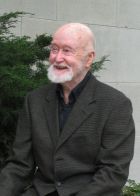
Benjamin N. Ward
Professor Emeritus
About Benjamin N. Ward
Benjamin N. Ward taught for 32 years in the Economics Department at UC Berkeley and also received his Bachelor's and PhD degrees from there. His teaching covered 36 years, including two years as an Assistant Professor at Stanford and two years abroad in Greece and Hong Kong. He retired in 1992.
Ward had two main research fields: Comparative Economic Systems, and Philosophy and Methodology of Economics. The first of these is a rather broad field, and led him into a range of research, from worker management in Yugoslavia (Illyria, 1958; Worker's Management, 1957) through modelling of socialist economic structures (Soc.Ec. 1967), the use of mathematical techniques in Soviet Russian planning (LP, 1967), comparative development (Yug.Ec.Hist., 1978; Grk.Reg.Dev., 1962; ChiEc.Dev., 1980), and economic planning in the West (Natl.Econ.Plan.Eur, 1975). He served as Director of the Department's program on the Greek economy, as Chair of the Center for Slavic and East European Studies, and spent a year in Hong Kong initiating a UC Berkelely master's degree program in Chinese studies at the Chinese University of Hong Kong. He was President of the Comparative Economics Association, and served as Principal Investigator for a Macarthur grant supporting both faculty research and graduate fellowships in interdisciplinary national security studies (5 years, $1 million).
Ward produced two books in his second field, Philosophy and Methodology, and is nearing completion of a third. The first of these (What'sWrong, 1972), focused on the way in which well-defined puzzles and social and career pressures give institutional structure to the field. The second (Ideal Worlds,1979), focused on the substantial role of ideology--liberal, conservative, and radical, in shaping economic research. The third emphasizes uncertainty and risk-seeking behavior as systematically underestimated by the discipline. A paper (LEP, 1988) offers an alternative way of appraising the results of economic activity, which is developed further in the book on uncertainty and risk-seeking.
It is unusual for someone who chose breadth over depth to survive in a major research university like UC-Berkeley. However it's quite natural for such a person to have a strong interest in teaching. Ward did regularly teach a variety of graduate courses in the Economics Department (Comparative Economic Systems, European Economic History, Political Economics, National Economic Planning), but was especially drawn to undergraduates who were not planning a career as an economist. The more energetic among them will likely be among the movers and shakers of the next generation, and teaching them was a delight.
Selected Publications:
The Socialist Economy, A Study of Organizational Alternatives, 1967, Random House.
What's Wrong With Economics? 1972, Basic Books
The Ideal Worlds of Economics, 1979, Basic Books
Problems of Greek Regional Development, 1962, Center of Economic Research monograph series, Athens.
(With George W. Breslauer & Harry Kreisler) Beyond the Cold War: Conflict and Cooperation in the Third World, UC Berkeley International and Area Studies 1991
Articles and Contributions to Books:
"Firm in Illyria: Market Syndicalism," The American Economic Review, Vol 48 #4 (Sept 1958), pp 566-589.
"Worker's Management in Yugoslavia," Journal of Political Economy, LXV #5, Oct. 1957
"Linear Programming & Soviet Planning," in Mathematics & Computers in Soviet Economic Planning, Yale Russian & East European Studies 5. Ed. J. P. Hardt, M. Hoffenberg, N. Kaplan & H.S. Levine, Yale Univ. Press 1967
"National Economic Planning & Policies in 20th C. Europe 1920-1970" in Carlo Cipolla, ed. Fontana Economic History of Europe, v. 5 1975.
"Political Power & Economic Change in Yugoslavia," American Economic Review, LVIII 2, May 1968, 568-79
"Yugoslav Economic History" in Irma Adelman, ed. conference volume l975(?)
"Chinese Approach to Economic Development" in Robert Dernberger, ed. The Chinese Economy in Comparative Perspective, 1980.
"LEP: An Alternative Criterion for Socio-Economic Valuation," Journal of Economic Issues vol XXII #3 Sept. 1988.
(With Douglas Pike), "Losing and Winning: Korea and Vietnam as Success Stories," Washington Quarterly vol.10 #3, Sept. 1987, pp 77-85.
"Dionysian Economics: Making Economics a Scientific Social Science," forthcoming in 2016 from Palgrave MacMillan
Oliver E. Williamson
Edgar F. Kaiser Professor Emeritus of Business, Economics, and Organization; Nobel Laureate 2009 (In Memoriam)
Glenn A. Woroch
Adjunct Professor
Danny Yagan
Associate Professor
About Danny Yagan
Danny Yagan is an Associate Professor of Economics at UC Berkeley, a Faculty Research Fellow of the National Bureau of Economic Research, a Faculty Associate of the Berkeley Burch Center for Tax Policy and Public Finance, and Faculty Co-Director of the Taxation and Inequality Initiative of the Berkeley Opportunity Lab. In 2018 he was awarded a Sloan Foundation Research Fellowship for early-career contributions. His work has been supported by the Sloan Foundation, Arnold Foundation, Washington Center for Equitable Growth, and centers at Berkeley, UC Davis, Rutgers, and Harvard. He joined the department after earning a BA summa cum laude and a PhD in economics from Harvard.
Janet Yellen
Eugene E. and Catherine M. Trefethen Professor Emerita of Business Administration; Professor Emeritus of Economics
Gabriel Zucman
Associate Professor of Economics and Summer School Director of the Stone Center on Wealth and Income Inequality
About Gabriel Zucman
Gabriel Zucman is the Summer School Director of the James M. and Cathleen D. Stone Center on Wealth and Income Inequality at the University of California at Berkeley. He received his PhD in 2013 from the Paris School of Economics and taught at the London School of Economics before joining the Berkeley faculty in 2015. His research focuses on the accumulation, distribution, and taxation of global wealth and analyzes the macro-distributional implications of globalization. He was awarded the Bernácer Prize and a Sloan Research Fellowship in 2019.



